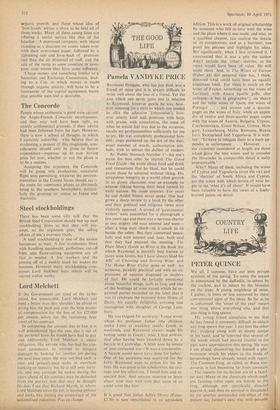Pamela VANDYKE PRICE
Raymond Postgate, who has just died, was a friend of mine and it is always difficult to write well about the loss of a friend. Yet the awe which one never quite lost in relation to Raymond, however gentle he was, how- ever amusing (in a style to which one tended to affix the adjective Johnsonian'), how- ever utterly kind and generous with help, with praise, with consolation, the sense of what he would feel was due to the occasion, recalls my professionalism sufficiently for me to try. He was completely professional him- self : copy presented on the dot of the date, exact number of words, authoritative atti- tude, style to attract the ,dullest of readers.
As 'Public Stomach Number l'—his son's name for him after he started The Good
Food Guide—he wrote about food and drink
and restaurants that he liked, but he could praise those he admired without liking. His scrupulous integrity in a world often greyish in its glossy character, was an example to anyone risking having their head turned by early success. He made enemies. For years he and Andre Simon never spoke. One had given a sharp review to a book by the other and their political and religious views were violently opposed. A crowd of 'gastronomic writers' were assembled for a photograph a few years ago and there was a nervous chatter as one mighty old man entered and went— after a long stair climb—to a couch to sit beside the other. But they' conversed peace- fully and with interest and, later, both said that they had enjoyed the meeting. The Plain Man's Guide to Wine is the book for which Raymond is possibly best known to many wine lovers, but I have always liked his ABC of Choosing and Serving Wine, and The Home Wine Cellar quite as well: no nonsense. pawkily practical and with no ex- pressions of opinion disguised as matters of fact. He could be lyrically emotional about beautiful things, such as love. and one of the bottlings of wine round which he or- ganised parties recorded on the label that it was to celebrate the recovery from illness of Daisy. his equally delightful. amusing and courageous wife, daughter of George Lans- bury.
He was exigent for accuracy.: T once wrote about his professor father (the children spoke Latin at weekday meals, Greek at weekends, and Raymond always made his lasting notes in Greek). who, I had written. died after having been knocked down by a bicycle in Cambridge. A brisk note by return of post corrected me—lt was a steamroller. A bicycle would never have done for father!. One of his ancestors was martyred for his faith. Raymond went to prison for his be- liefs. He was great in his scholarshin, his cou- rage and his affections. I loved him and re- spected him. And anyone wanting to learn about wine may well wish that more of us could write like him.
It is good that Julian Jeffs's Sherry (Faber £2.50) is now republished in an up-to-date edition. This is a work of original scholarship by someone who fell in love with the wine and the place where it was made, and who, as a qualified chemist, can analyse the details of its complexities, and as a barrister, can point his phrases and highlight his ideas. But significantly, when I first reviewed it, I commented that it was a pity the author didn't include the `other' sherries, as his views would have been of value. He still omits them. And, in The Wines of Europe (Faber £4) this personal view has, I think, distorted what could have been an equally important book. For there is much on the wines of France, something on the wines of Germany with Alsace (quelle gaffe, cher collegue—a bas la geographie!), on sherry and the table wines of Spain, the wines of Portugal . . . and sixteen and a quarter pages on the wines of Italy, while an appen- dix of twelve and three-quarter pages copes with the wines of Austria, Bulgaria, Cyprus, Czechoslovakia, Great Britain, Greece, Hun- gary, Luxembourg, Malta, Romania, Russia (sic), Switzerland and Yugoslavia. It is writ- ten: `To have to relegate them to a mere ap- pendix is unfortunate . . . However, . . the countries considered at length are those which grow the best wines, and to consider the remainder in comparable detail is sadly impracticable.'
Why? Many of these, including the wines of Cyprus and Yugoslavia (even the Lac) and the 'sherries' of South Africa and Cyprus, are the wines with which lovers of wine be- gin to see 'what it's all about'. It would have been valuable to have the views of a finely- trained palate on detail.










































 Previous page
Previous page